Introduction
Family nurse practitioners (FNPs) are vital personnel in the provision of patient care services:
- FNPs deal with the treatment and diagnosis of patients, from children to the elderly.
- FNPs are mainly concerned with the family unit (Thome & Arnardottir, 2013).
- Demand for FNPs has continued to increase over the years.
- FNPs can be allowed to practice independently in some states.
FNPs have an important role in primary health care, patient education, and improving the general health of patients. This presentation aims to discuss FNPs and how AACN essentials are applicable to their practice. It also details how an FNP would apply the skills described in the AACN essentials.
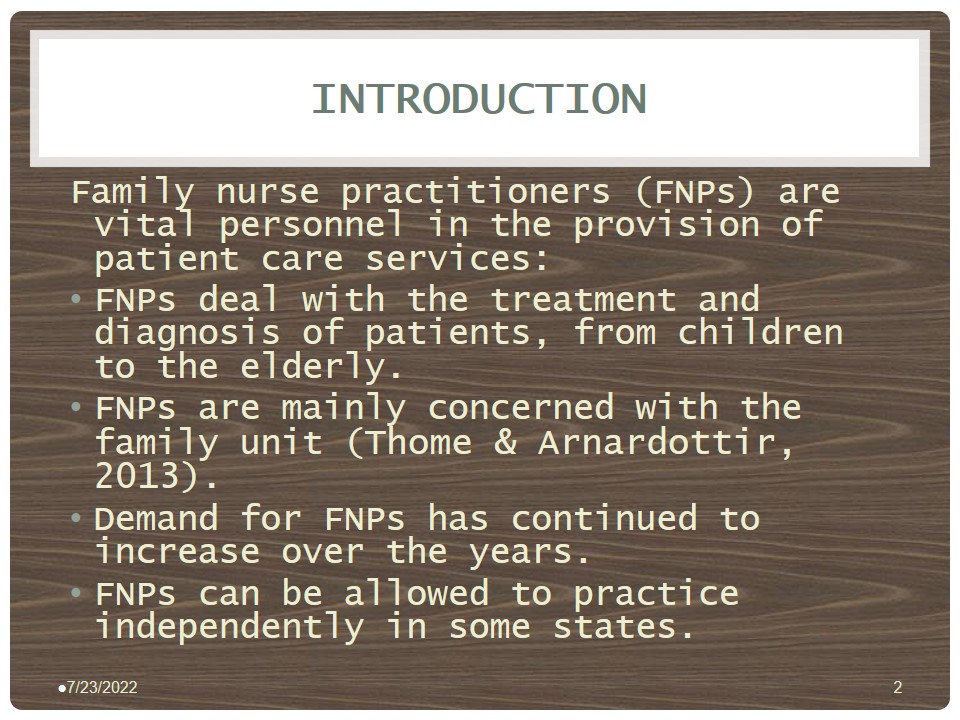
Roles of Family Nurse Practitioners
- FNPs are involved in hospital-based home health care.
- They Prescribe age-specific rehabilitation and therapies.
- FNPs conduct physical examination and analyze medical histories.
- They provide family planning services, screening, and pre-natal care (Thome & Arnardottir, 2013).
The roles played by FNPs include providing of hospital-based home health services, prescribing age-specific rehabilitation and therapies, conducting physical examinations, and analyzing the medical history of patients to come up with effective patient care strategies. FNPs are also involved in providing family planning services, screening, pre-natal care, and managing patients who suffer from acute chronic illnesses.
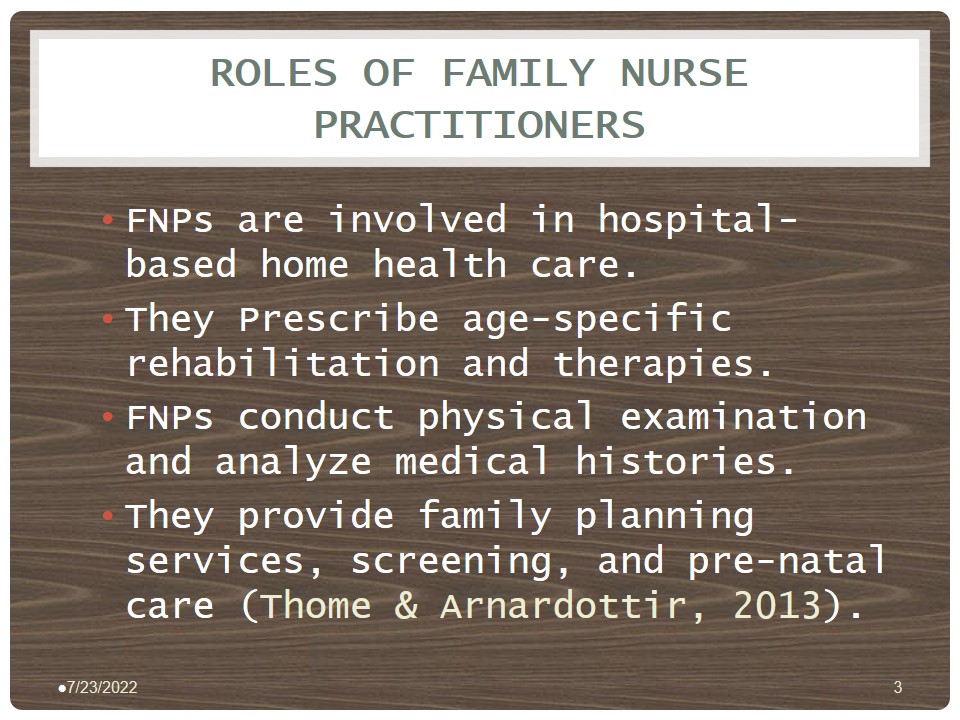
Other responsibilities
- FNPs manage acute chronic illness patients.
- They provide clinical resources and support to staff.
- Clinical research on the impact of the family on the patient’s health.
- They do staff and patient education.
- FNPs perform minor surgical procedures.
Other responsibilities of FNPs include providing clinical resources and support to the staff, conducting clinical research on the impact of family dynamics on the patient’s health, staff and patient education, working in a collaborative family practice, and performing minor surgeries.
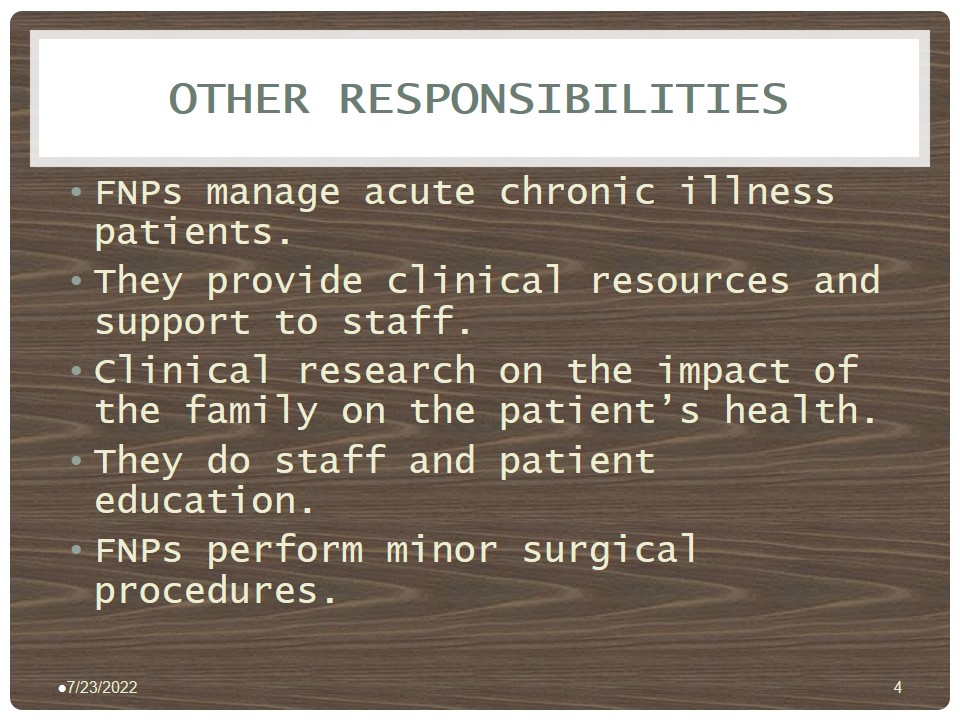
Applicable AACN Essentials
- Background for Practice from Sciences and Humanities:
- Information from other scientific fields is integrated into nursing practice.
- FNPs are able to improve their practice within a diverse environment.
- Organizational and Systems Leadership:
- Ensures ethical decisions are made.
- Improves working relationships (AACN, 2011).
- Quality Improvement and Safety:
- Being well informed about the quality expectations they have to meet.
- Implementing the required strategies in quality improvement.
- Translating and Integrating Scholarship into Practice:
- Utilize education and training to:
- Solve issues arising during practice
- Facilitate changes
- Analyze results
- Utilize education and training to:
- Informatics and Healthcare Technologies:
- Apply various forms of technologies, such as:
- Patient care technologies.
- Communication technologies.
- Apply various forms of technologies, such as:
- Health Policy and Advocacy:
- Intervene in the policy development process.
- Apply advocacy techniques to influence health care (AACN, 2011).
- Clinical Prevention and Population health for Improving Health:
- Integrate concepts.
- Apply evidence-based strategies to specific populations.
- Interprofessional Collaboration for Improving Patient andPopulation Health Outcomes (AACN, 2011):
- Improve health outcomes through:
- Consultations;
- Collaborations;
- Coordinated efforts;
- Communication.
- Improve health outcomes through:
- Master’s Level Nursing Practice:
- Nursing interventions that affect health care outcomes.
- Advanced level of knowledge on all family based nursing practices.
- Ability to apply knowledge into practice (AACN, 2011).
- Essential 1: FNPs are able to apply knowledge gained from other fields into their nursing practice. Thus, findings from diverse fields like genetics, quality improvement, public health, and biopsychosocial fields provide valuable information for a master’s prepared nurse (AACN, 2011).
- Essential 2: The success of any organization relies on its leadership. Therefore, FNPs apply organizational leadership skills to improve the quality of patient care. Making ethical decisions also improves patient care strategies, thereby guaranteeing the safety of the patients under care (AACN 2011).
- Essential 3: A master’s prepared nurse has the knowledge on how to improve the quality needs of an organization. Thus, they are aware of the different strategies that should be applied, such as tools and performance measures, in improving quality and safety in an organization (AACN, 2011).
- Essential 4: The FNP is able to use the education and training they have received in solving health care issues that arise during practice. They are also involved during the change process when coming up with new initiatives that improve their practice (AACN, 2011).
- Essential 5: The FNP can use various forms of technologies, such as patient-care technologies, to deliver and enhance care. They can also apply communication technologies to coordinate and integrate their patient care efforts.
- Essential 6: The FNP can also be involved in the policy making process within the health care system. Moreover, they can apply advocacy techniques to influence health care.
- Essential 7: The FNP should be able to integrate various concepts when planning and delivering clinical based interventions to patients whom the Family Nurse Practitioner assists.
- Essential 8: The FNP should be involved in collaborative efforts with other professionals to manage and coordinate patient care. This can be done though consultations, collaborations, coordination efforts, and communication via established channels.
- Essential 9: The FNP should be involved in nursing interventions that affect health care outcomes. Moreover, the FNP has an advanced knowledge of family based nursing practices because they undergo an advanced nursing education. They are able to apply the knowledge attained into the patient care practice.
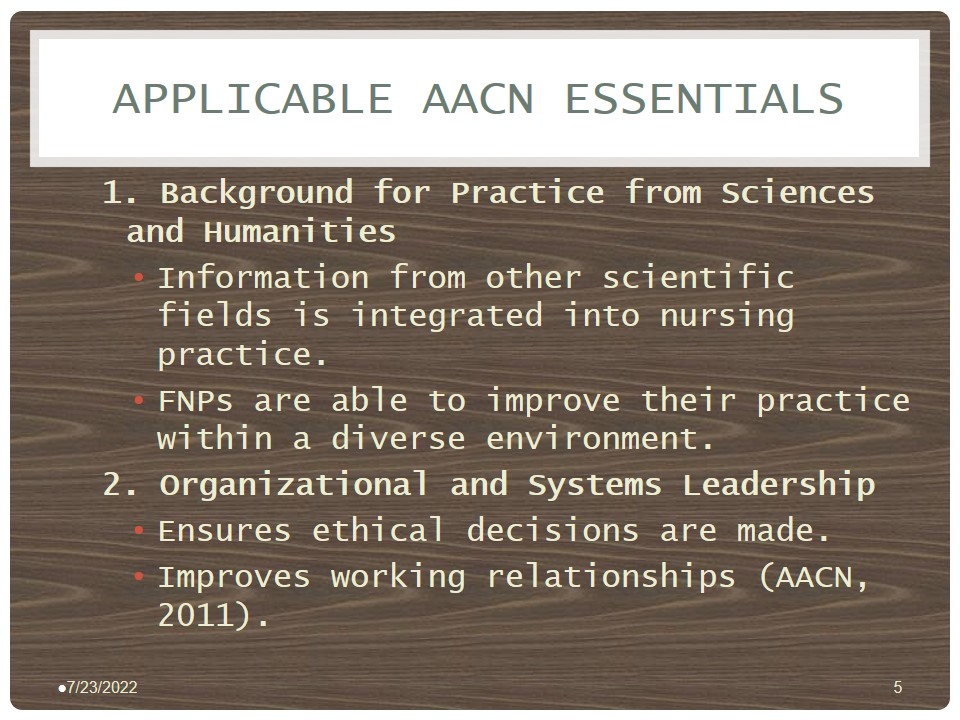
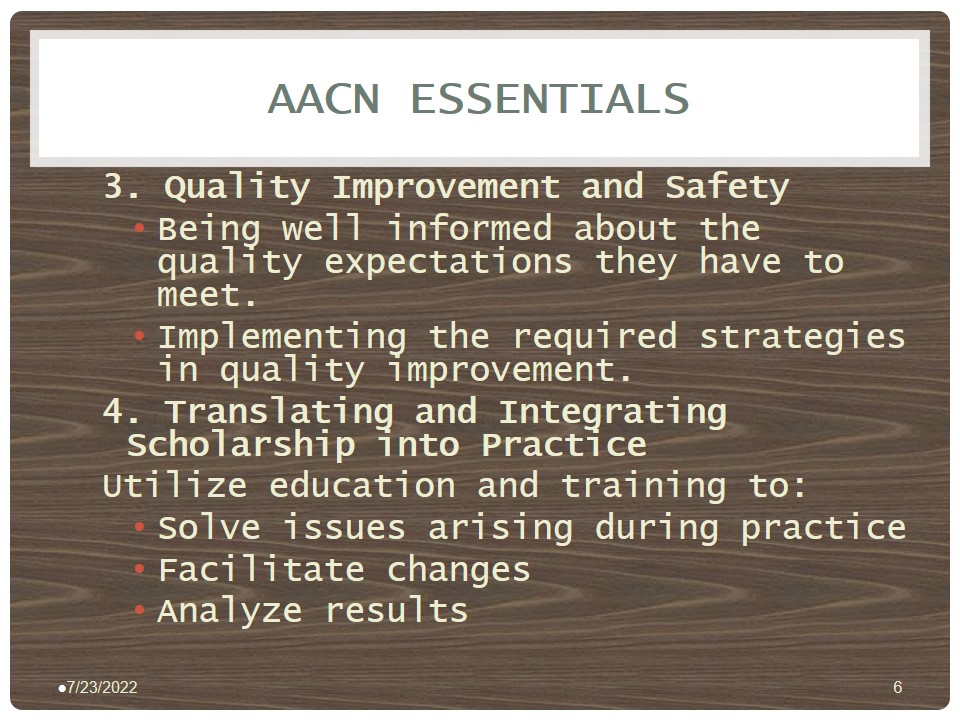
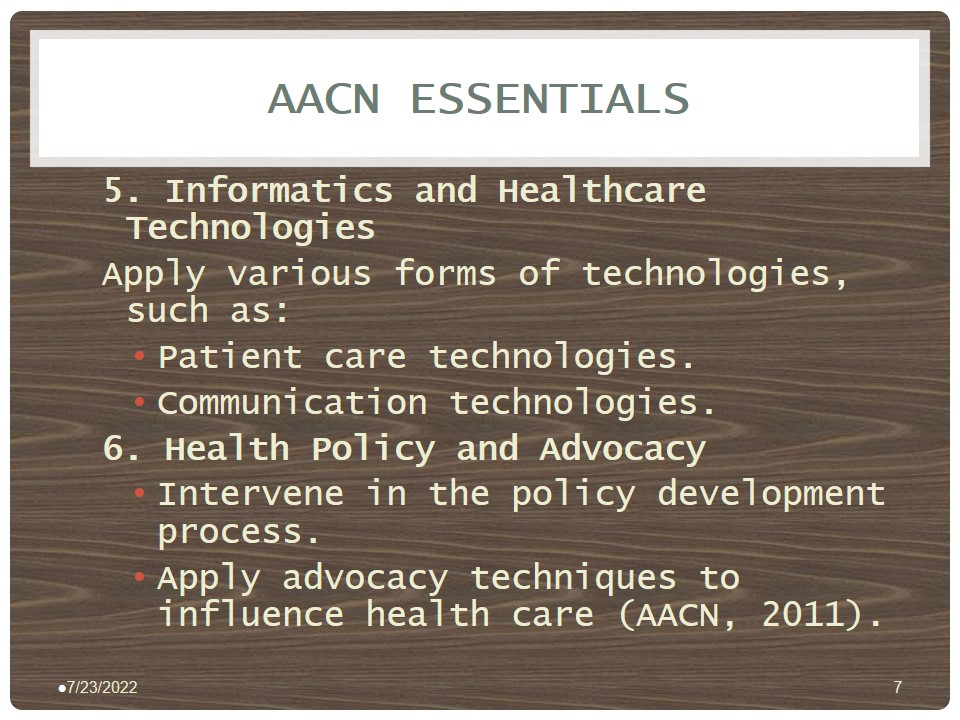
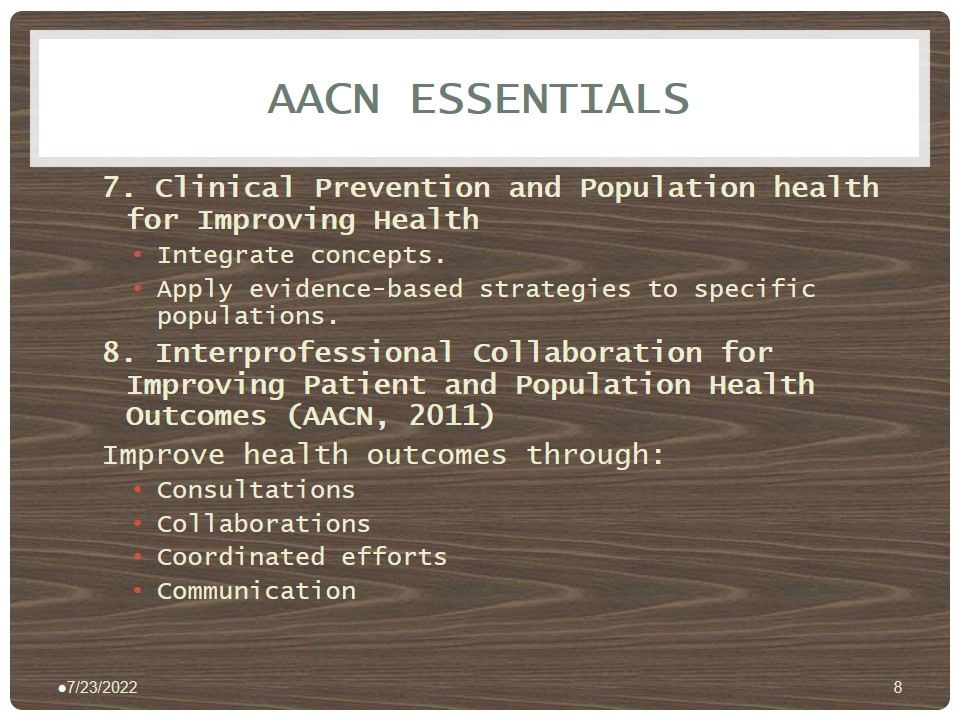
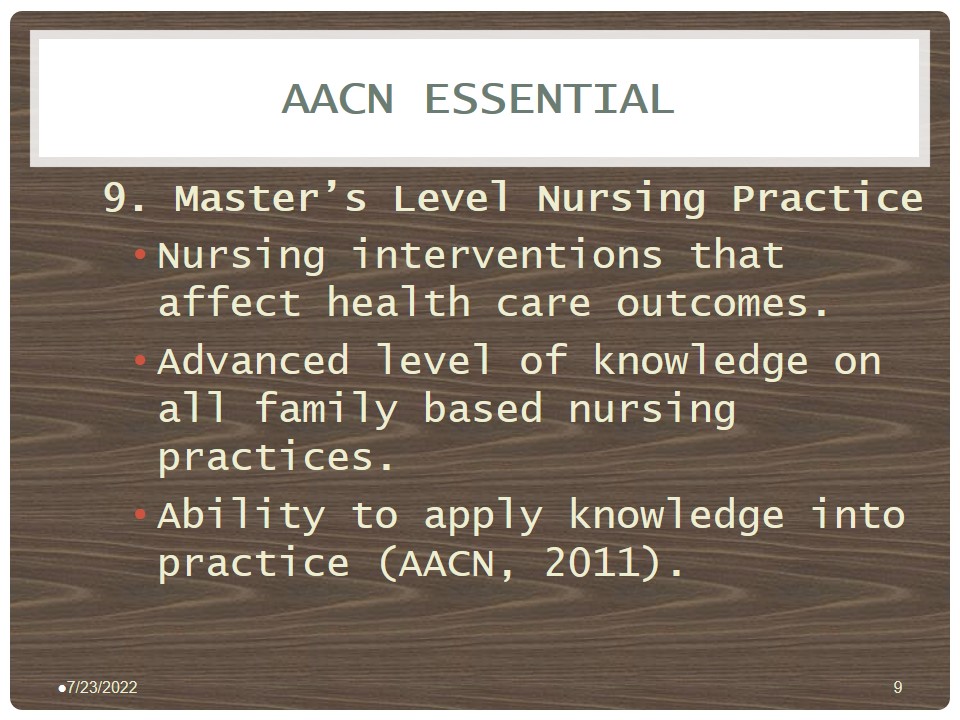
Application of the 1st Essential
- Use of scientific foundations for nursing practice:
- Implement knowledge from sciences and humanities in the context of family-based nursing.
- Analyze evidence for improving FNP practice.
- Establish new approaches through practice knowledge.
- Apply clinical reasoning and ethical analysis to evaluate advanced nursing care delivery.
Master’s prepared FNPs can utilize scientific foundations in order to improve their practice.
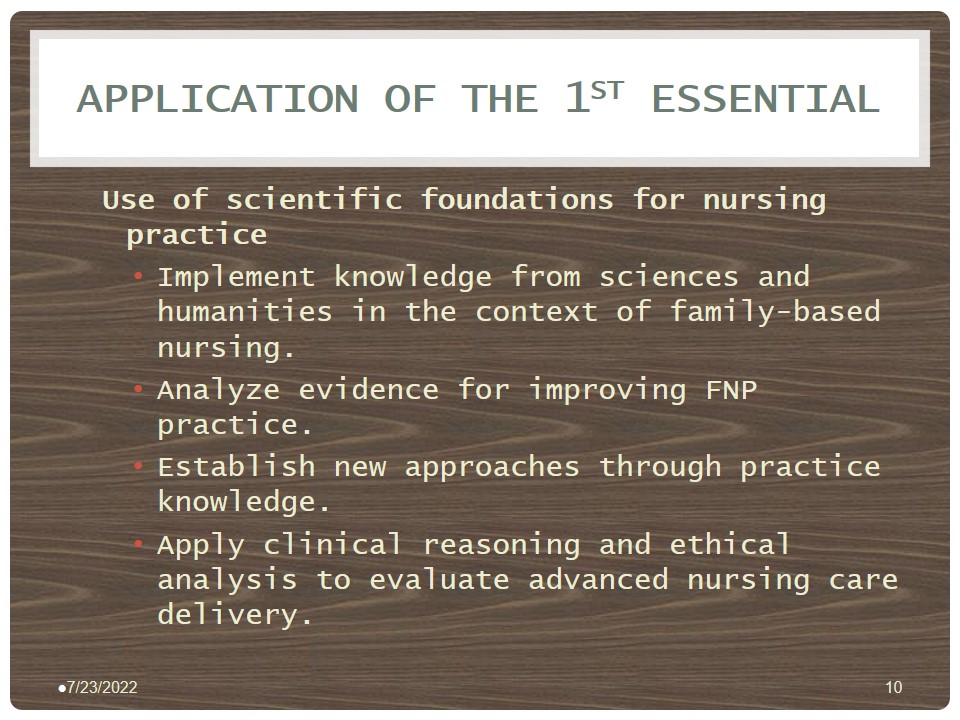
Empirical Evidence
- Illness prevention, wellness, and health promotion are encouraged through scientific evidence (APTR 2009).
- Science is a source of knowledge for coming up with effective patient care choices (Johnson, Fontelo, Olsen, Jones, & Gimbel, 2013).
Master’s prepared nurses use quality processes and improvement science to analyze outcomes resulting from patient data. Through scientific methods, the nurses are able to monitor trends acquired from clinical data and use it to come up with effective patient care choices.
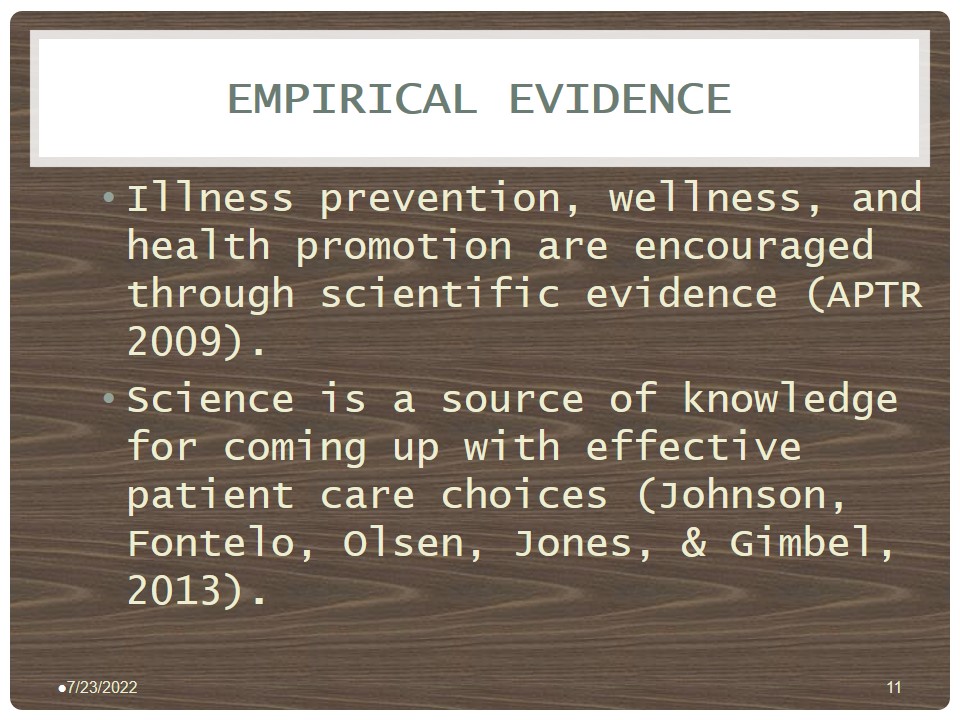
Application of the 2nd Essential
- Translating and Integrating Scholarship into Practice:
- Utilizing education and training to:
- Solve issues rising during practice.
- Apply an inquiry attitude in their practice.
- Identify gaps where there is no scientific evidence.
- Implement changes.
- Translate current evidence.
- Utilizing education and training to:
A master’s prepared nurse can also apply the “Translating and Integrating Scholarship into Practice” essential by solving issues that arise during practice. Thus, the family nurse practitioner should develop and inquire attitude towards their practice so that they can identify gaps that arise in situations that have no evidence. They are also involved in the implementation of changes and translating current evidence.
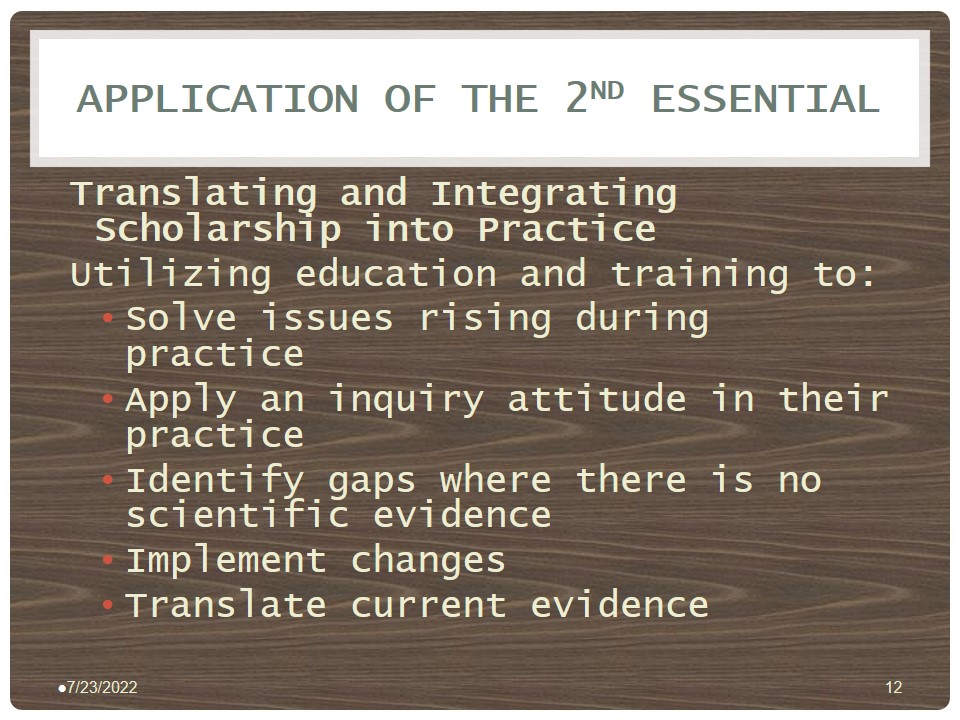
Empirical Evidence
- Family nurse practitioners are at the forefront of a continuous improvement process (APTR 2009).
- They assist others in the application of evidence-based practice (Johnson et al., 2013).
Master’s prepared nurses take leadership roles in the improvement processes, which are continuous and rely on translational research skills. Therefore, family nurse practitioners assist others in the application of evidence-based practices. They are also involved in identifying questions that require answers, creating the evidence that requires innovation, and analyzing the outcomes.
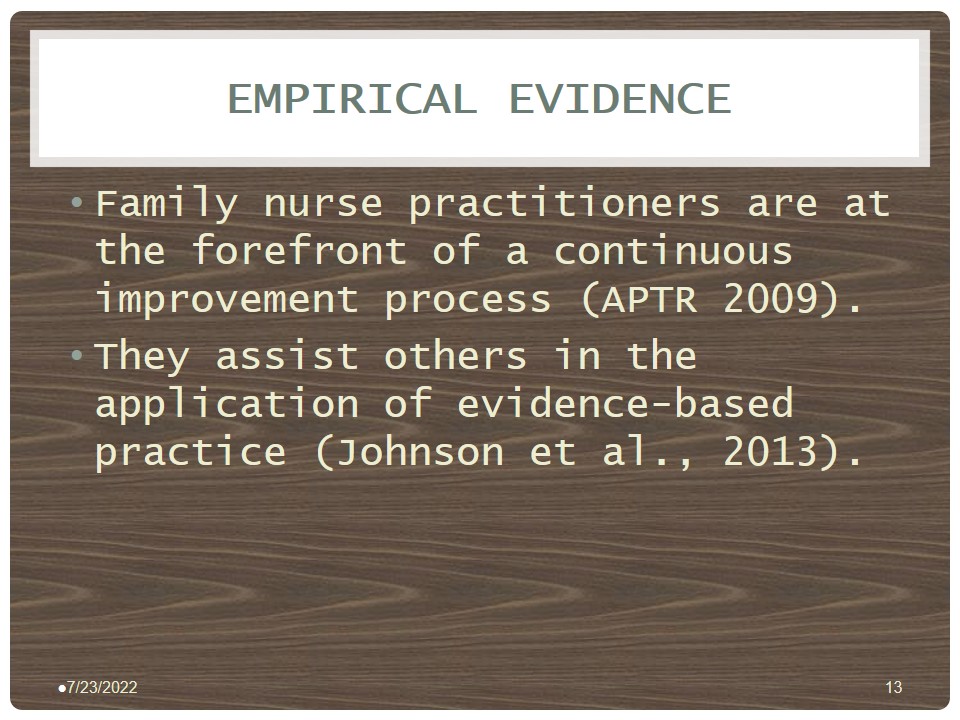
Application of the 3rd Essential
- Clinical Prevention and Population Health for Improving Health:
- Integrate concepts to develop a culturally appropriate health education.
- Apply evidence-based strategies to specific populations.
- Analyze patients’ history to determine risks to their health.
The family nurse practitioner can also apply the “Clinical Prevention and Population Health for Improving Health” essential, whereby the health system is culturally responsive and considers the unique characteristics of a large population. This arises from the establishment of a population-based care which analyses patient history and leads to innovations that reduce risk to chronic illnesses, promotes health and prevents diseases.
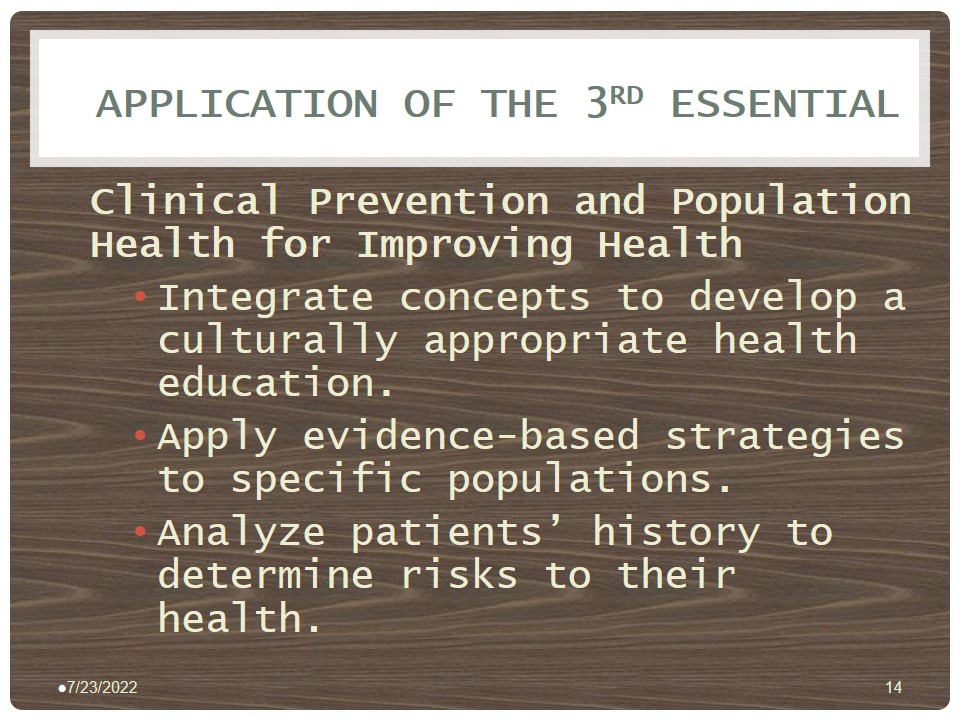
Empirical Evidence
- Lifelong learning is a key component of developing population-based care (AACN, 2011).
- It helps in meeting the needs of unique groups in the population (Johnson et al., 2013).
According to AACN (2011), developing population-based care is a life long procedure, where the family nurse practitioner is able to aggregate populations to come up with population-based care strategies that consider differences arising from cultures and ethnic groups. Therefore, the nurses are able to meet the needs of the unique groups within a population.
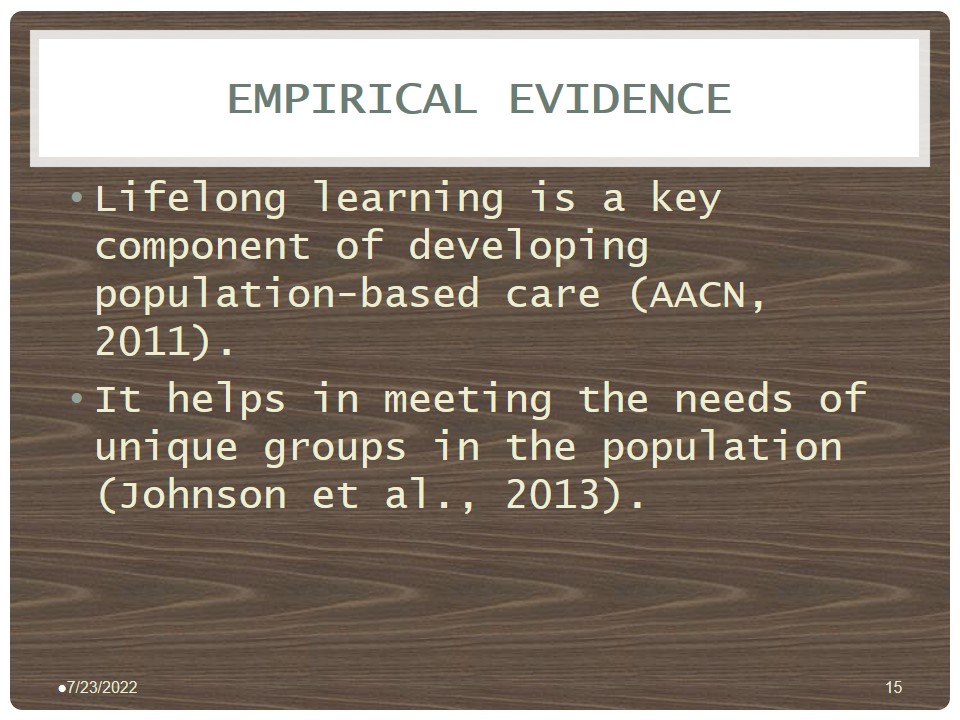
Summary
- Family nurse practitioners are part of the master’s specialty track.
- Family nurse practitioners deal with a diverse group of patients, mainly the family unit.
- AACN essentials are vital for the Family Nurse Practitioners.
- Family nurse practitioners can apply the AACN essentials through:
- The use of scientific foundations for nursing practice.
- Translating and integrating scholarship into practice.
- Clinical prevention and population health for improving health.
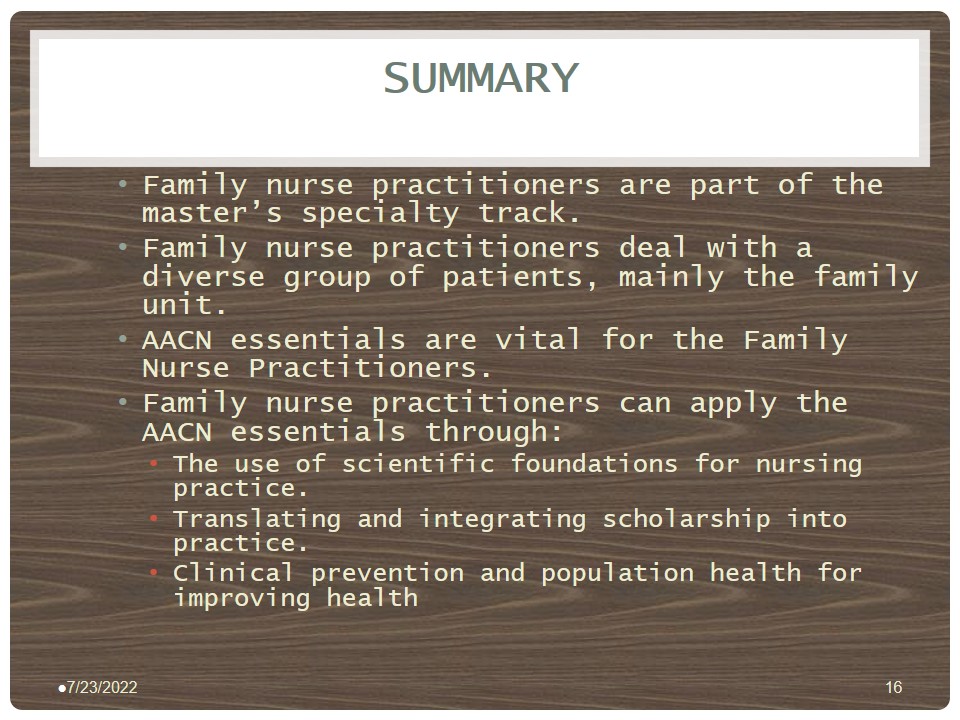
References
AACN (2011). The essentials of Master’s Education in Nursing. American Association of Colleges of Nursing. Web.
APTR (2009). Clinical prevention and population health curriculum framework. Association for Prevention Teaching and Research. Web.
Johnson, H. L., Fontelo, P., Olsen, C. H., Jones, K. 2., & Gimbel, R. W. (2013). Family nurse practitioner student perception of journal abstract usefulness in clinical decision making: a randomized controlled trial. Journal of the American Association Of Nurse Practitioners, 25(11), 597-603. Web.
Thome, M., & Arnardottir, S. B. (2013). Evaluation of a family nursing intervention for distressed pregnant women and their partners: a single group before and after study. Journal of Advanced Nursing, 69(4), 805-816. Web.